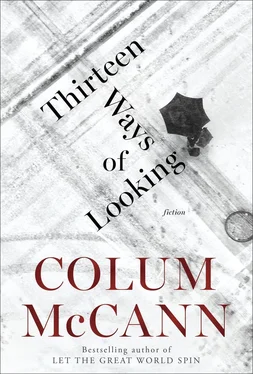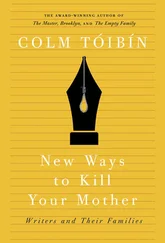Colum McCann - Thirteen Ways of Looking
Здесь есть возможность читать онлайн «Colum McCann - Thirteen Ways of Looking» весь текст электронной книги совершенно бесплатно (целиком полную версию без сокращений). В некоторых случаях можно слушать аудио, скачать через торрент в формате fb2 и присутствует краткое содержание. Год выпуска: 2015, Издательство: Random House Publishing Group, Жанр: Современная проза, на английском языке. Описание произведения, (предисловие) а так же отзывы посетителей доступны на портале библиотеки ЛибКат.
- Название:Thirteen Ways of Looking
- Автор:
- Издательство:Random House Publishing Group
- Жанр:
- Год:2015
- ISBN:нет данных
- Рейтинг книги:5 / 5. Голосов: 1
-
Избранное:Добавить в избранное
- Отзывы:
-
Ваша оценка:
- 100
- 1
- 2
- 3
- 4
- 5
Thirteen Ways of Looking: краткое содержание, описание и аннотация
Предлагаем к чтению аннотацию, описание, краткое содержание или предисловие (зависит от того, что написал сам автор книги «Thirteen Ways of Looking»). Если вы не нашли необходимую информацию о книге — напишите в комментариях, мы постараемся отыскать её.
and
comes an eponymous novella and three stories that range fluidly across time, tenderly exploring the act of writing and the moment of creation when characters come alive on the page; the lifetime consequences that can come from a simple act; and the way our lives play across the world, marking language, image and each other.
Thirteen Ways of Looking Brilliant in its clarity and deftness, this collection reminds us, again, why Colum McCann is considered among the very best contemporary writers.
Thirteen Ways of Looking — читать онлайн бесплатно полную книгу (весь текст) целиком
Ниже представлен текст книги, разбитый по страницам. Система сохранения места последней прочитанной страницы, позволяет с удобством читать онлайн бесплатно книгу «Thirteen Ways of Looking», без необходимости каждый раз заново искать на чём Вы остановились. Поставьте закладку, и сможете в любой момент перейти на страницу, на которой закончили чтение.
Интервал:
Закладка:
— I’d like to be alone with my wife.
Rebecca lifted her head. Wife: it was like a word that might remain on a page, though the page itself was plunged into darkness.
Alan repositioned the wicker chair and let out a long sigh. It was plain to see that he was seeking the brief adulation of grief. He needed the loss to attach itself to him. Why hadn’t she woken? he asked. Was the door to her bedroom open or closed? Had she slept through her alarm? Had Tomas eaten any breakfast? How far could he swim? Why didn’t you get him a wetsuit that fit? Why didn’t you hide it away? Did you give him his limits? You know he needs his limits.
She thought about that ancient life in the Dublin hills, the shiny kitchen, the white machinery, the German cars in the pebbled driveway, the clipped bushes, the alarm system, the security cameras, the limits, yes, and how far the word might possibly stretch before it rebounded.
— Did he have gloves on?
— Oh, stop, please, Alan.
— I need to know.
The red lights of the clock shone. It had been twelve hours. She lay on the bed.
— No, he had no gloves on, Alan.
She could not shake the Israeli story from her head. An Arab couple had lost their children to two illnesses over the course of five years: one to pneumonia, the other to a rare blood disorder. It was a simple story — small, intimate, intense. The father worked as a crane driver in the docklands of Haifa, the mother as a secretary in a corrugated-paper firm. Their ordinary lives had been turned inside out. After the children died, the father filled a shipping container with their possessions and every day moved it, using the giant crane and the skyhooks, to a new site in the yard, carefully positioning it alongside the sea: shiny, yellow, locked.
— He feels invincible, doesn’t he?
— Oh, Jesus, Alan.
The search parties were spread out along the cliffs, their hopeless whistles in the air, her son’s name blown back by the wind. Rebecca pushed open the rear sliding doors to the balcony. The sky was shot through with red. A stray sycamore branch touched her hair. She reached up. A crushing pain split her shoulder blade: her rotator cuff.
Cigarette smoke lingered in the air. She rounded the back of the cottage. A woman. Plainclothes. The whistles still came in short, sharp bursts.
A loss had lodged itself inside her. Rebecca gestured for the cigarette, drew long and hard on the filter. It tasted foul, heavy. She had not smoked in many years.
— He’s deaf, you know, she said, blowing the smoke sideways.
A tenderness shone in the detective’s eyes. Rebecca turned back into the house, pulled on her coat, walked out the front door and down toward the cliffs.
A helicopter broke the dark horizon, hovered for a moment right above the cottage, its spotlight shining on the stone walls, until it banked sharply and continued up the coast.
She joined the searchers. They went in groups of three, linking arms. The land was potholed, hillocked, stony. Every now and then she could hear a gasp from a neighboring group when a foot rolled across a rock, or a lost lobster pot, or a piece of rubbish. The stone walls were cold to the touch. The wind ripped under a sheet of discarded plastic. Tiny tufts of dyed sheep wool shone on the barbed wire: patterns of red and blue.
Along the coast small groups zigzagged the distant beaches in the last of the light. Dozens of boats plied the waves. The bells on the ancient boats tinkled. A Galway hooker went by with its white sails unfurled. A fleet of kayaks glided close to the shore, returning home.
The moon rose red: its beauty appeared raw and offensive to her. She turned inland. Two detectives walked alongside. Rebecca felt suspended between them. Cones of pale torch beam swept through the gathering darkness.
At an abandoned home, roofless, hemmed in by an immense rhododendron bush, a call came over the radio that a wetsuit had been found, over. The male detective held a finger in the air, as if figuring the direction of the wind. No, not a wetsuit, said the voice, high alert, no, there was something moving, high alert, stand by, stand by, there was something alive, a ripple in the water, high alert, high alert, yes, it was a body, a body, they had found something, over, a body, over.
The detective turned away from her, moved into the overgrown doorway, shielded the radio, stood perfectly still in the starlight until the call clarified itself: it was a movement in the water, discard, they had seen a seal, discard the last report, only a seal, repeat, discard, over.
Rebecca knew well the legend of the selkie. She thought of Tomas zippering his way out into the water, sleek, dark, hidden.
The female detective whispered into the radio: For fucksake, be careful, we’ve got the mother here.
The word lay on her tongue now: mother, máthair, em. They went forward again, through the unbent grass, into the tunnels of their torches.
—
ALAN’S CLOTHING WAS FOLDED on the wicker chair. His knees were curled to his chest. A shallow wheeze came from the white of his throat. A note lay on her pillow: They wouldn’t let me sleep in Tomas’s room, wake me when you’re home. And then a scribbled Please.
They had called off the search until morning but she could hear the fishing boats along the coast, still blasting their horns.
Rebecca took off her shoes, set them by the bedroom fire. Only a few small embers remained, a weak red glow. The cuffs of her jeans were wet and heavy from the muck. She did not remove them.
She went to the bed and lay on top of the covers, pulled up a horsehair blanket, turned away from Alan. Gazing out the window, she waited for a bar of light to rise and part the dark. A torchlight bore past in a pale shroud. Perhaps there was news. At the cliff he had twirled the imaginary cane. Where had he learned that Chaplin shuffle? The sheer surprise of it. The unknowability. Unspooling himself along the cliff.
From the living room came the intermittent static of the radios. Almost eighteen hours now.
Rebecca pushed her face deeper into the pillow. Alan stirred underneath the sheets. His arm came across her shoulder. She lay quite still. Was he sleeping or awake? How could he sleep? His arm tightened around her. His hand moved to her hair, his fingers at her neck, his thumb at the edge of her clavicle.
That was not sleep. That was not sleep at all.
She gently pushed his arm away.
Another torch bobbed past the window. Rebecca rose from the bed. A gold-backed hairbrush lay on the dressing table. Long strands of her dark hair were tangled up inside it. She brushed only one side of her hair. The damp hem of her jeans chilled her toes and she walked toward the wicker chair, covered herself in a blanket, looked out into the early dark.
When dawn broke, she saw the door open slightly, the female detective peeping in around the frame, something warm in the eye-flicker between them.
Alan stirred, pale in the bed, and moaned something like an excuse. His pinkish face. His thinning hair. He looked brittle to her, likely to dissolve.
In the kitchen the kettle was already whistling. A row of teacups were set along the counter. The detective stepped forward and touched her arm. Rebecca’s eyes leaped to catch hers, a brief merged moment.
— I hope you don’t mind. We took the liberty. There’s no news yet.
The presence of the word yet jolted her. There would, one day, be news. Its arrival was inevitable.
— We took one of Tomas’s shirts from the wash basket.
— Why? said Rebecca.
— For the dogs, the detective said.
Rebecca wanted suddenly to hold the shirt, inhale its odor. She reached for the kettle, tried to pour through the shake in her hands. So, there would be dogs out on the headland later. Searching for her son. She glanced at her reflection in the window, saw only him. His face was double-framed now, triple-framed. Out on the headland, running, the dogs following, a ram, a hawk, a heron. She felt a lightness swell in her. A curve in the air. A dive. She gripped the hem of the counter. The slow, sleek slip of the sea. A darkening underwater. The shroud of cold. The coroner, the funeral home, the wreaths, the plot, the burial. She felt herself falter. The burst to the surface. A selkie, spluttering for air. She was guided into a chair at the table. She tried to lean forward to pour the tea. Voices vibrated around her. Her hands shook. Every outcome was unwhisperable. She had a sudden thought that there was no sugar in the house. They needed sugar for their tea. She would go to the store with Tomas later. The newsagent’s. Yes, that is where she would go. Inland along the bend of narrow road. Beyond the white bungalow. Crossing at the one traffic light. Walk with him past the butcher shop, past the sign for tours to the islands, past the turf accountant, past the shuttered hotel, the silver-kegged alleyway, into the newsagent’s on Main Street. The clink of the anchor-shaped bell. The black-and-white linoleum floor. Along the aisle. The sharp smell of paraffin. Past the paper rack set up on lobster pots, the small blue-and-orange ropes hanging down, old relics of the sea. She would walk beyond the news of his disappearance. Bread, biscuits, soup. To the shelf where the yellow packets of sugar lay. We cannot do without sugar, Tomas, second shelf down, trust me, there, good lad, get it, please, go on, reach in.
Читать дальшеИнтервал:
Закладка:
Похожие книги на «Thirteen Ways of Looking»
Представляем Вашему вниманию похожие книги на «Thirteen Ways of Looking» списком для выбора. Мы отобрали схожую по названию и смыслу литературу в надежде предоставить читателям больше вариантов отыскать новые, интересные, ещё непрочитанные произведения.
Обсуждение, отзывы о книге «Thirteen Ways of Looking» и просто собственные мнения читателей. Оставьте ваши комментарии, напишите, что Вы думаете о произведении, его смысле или главных героях. Укажите что конкретно понравилось, а что нет, и почему Вы так считаете.












